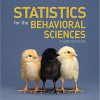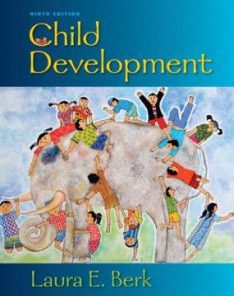Test Bank for Child Development Principles And Perspectives 2nd Edition Cook
$35.00 Original price was: $35.00.$26.50Current price is: $26.50.
Test Bank for Child Development Principles And Perspectives 2nd Edition Cook
Test Bank for Child Development Principles And Perspectives 2nd Edition Cook

Product details:
- ISBN-10 : 0205494064
- ISBN-13 : 978-0205494064
- Author: Joan Littlefield Cook
The topically-organized Child Development, Second Edition combines streamlined coverage with an application-driven active learning system. Cook and Cook focus students on how they can promote positive child development by putting the science to work outside of the classroom.
Looking for additional resources to help you understand the material and succeed in this course? MyDevelopmentLab contains study tools such as flashcards, self tests, videos, as well as MyVirtualChild which allows you to raise your own virtual child from birth through age 18 and monitor the results.
Table contents:
CHAPTER 1
EXPLORING CHILD DEVELOPMENT
DEFINING THE FIELD
What Develops?
What Drives Development? Nature, and Nurture, and Reciprocal Relationships
THEORIES OF CHILD DEVELOPMENT
What Is a Theory, and Why Are Theories Useful?
Psychoanalytic Theories
Behavioral and Social Learning Theories
Cognitive Theories
Biological Theories
Contextual and Systems Theories
USING THE SCIENTIFIC METHOD: RESEARCH IN CHILD DEVELOPMENT
Descriptive Research Methods
Correlational Research Methods: Measuring Associations
Experimental Research Methods: Determining Cause and Effect
Methods for Assessing Development
Ethics in Research with Children
APPLICATIONS OF CHILD DEVELOPMENT RESEARCH AND CAREERS RELATED TO CHILDREN
Practical Applications of Child Development Research
Personal Perspective “Meet First-Time Expectant Parents”
Social Policy Perspective: “Every Day in America”
Careers Related to Children
Professional Perspective: “Career Focus: Meet a School Social Worker”
CHAPTER 2
HEREDITY AND THE ENVIRONMENT
GENES AND HUMAN REPRODUCTION
Genes and the Magical Four-Letter Code
Social Policy Perspective: “Protecting the Genetic Privacy of Citizens”
Human Reproduction and Cell Division
Personal Perspective: “Meet a Couple Who Used Artificial Insemination ”
HOW TRAITS AND GENETIC ABNORMALITIES ARE INHERITED
Dominant—Recessive Traits
Chromosome Abnormalities
Prenatal Screening and Genetic Testing
Professional Perspective: “Career Focus: Meet a Genetic Counselor”
HOW GENES AND ENVIRONMENTS INTERACT
Range of Reaction
Canalization
Niche-Picking: I Gotta Be Me …
Probabilistic Epigenesis: Activating Your Genes
BEHAVIOR GENETICS: MEASURING THE HERITABILITY OF TRAITS
Behavior Genetics, Heritability, and Shared and Nonshared Environments
How Is Heritability Estimated?
Heritability of Complex Characteristics
CHAPTER 3
PRENATAL DEVELOPMENT AND BIRTH
PRENATAL DEVELOPMENT
Conception
Stages of Prenatal Development
TERATOGENS: HEALTH RISKS FOR THE BABY
Alcohol
Personal Perspective: “Meet a Family Who Adopted a Child with FAS”
Cocaine
Cigarette Smoking
Social Policy Perspective: “The Case of Malissa Ann Crawley”
Maternal Health
Maternal Age
Critical Periods
The Role of Fathers
THE PROCESS OF BIRTH
Stages of Birth
Options in Giving Birth: Choices and Alternatives
Professional Perspective: “Career Focus: Meet a Certified Nurse—Midwife.”
Drugs during Labor and Delivery
The Partner’s Role: Helping During Birth
Birthing Complications: Something Isn’t Right
Here’s the Newborn!
INFANTS AT RISK: PREMATURITY AND INFANT MORTALITY
What Is Prematurity?
Infant Mortality
Prenatal Care: Having a Healthy Baby
BECOMING A FAMILY: PSYCHOLOGICAL ADJUSTMENTS TO HAVING A NEWBORN
The Transition to Parenthood
Becoming the Big Brother or Sister
CHAPTER 4
PHYSICAL DEVELOPMENT: BODY, BRAIN, AND PERCEPTION
PHYSICAL GROWTH AND THE DEVELOPMENT OF MOTOR COORDINATION
Physical Growth
Reflexes: The Infant’s First Coordinated Movements
Voluntary Movements: The Motor Milestones
Professional Perspective: “Career Focus: Meet a Physical Therapist”
Nutrition and Eating-Related Problems
DEVELOPMENT OF THE BRAIN AND NERVOUS SYSTEM
Structure of the Brain and Nervous System
Forming the Brain and Nervous System
The Role of Experience in Brain Development
Social Policy Perspective: “Can Mozart Stimulate Neural Connections in Infants?”
Neural Plasticity and Sensitive Periods
Larger Developmental Patterns in the Brain
PERCEPTUAL DEVELOPMENT
Robert Fantz and Visual Preferences
Habituation—Dishabituation Research
Vision
Auditory Perception
Perception of Smell and Taste
Intermodal Perception
HEALTH AND SAFETY ISSUES
Childhood Deaths and Safety Issues
Child Abuse and Neglect
Personal Perspective: One Survivor’s Story
CHAPTER 5
COGNITIVE DEVELOPMENT: PIAGETIAN AND SOCIOCULTURAL VIEWS
PIAGET’S CONSTRUCTIVIST VIEW OF COGNITIVE DEVELOPMENT
Piaget as a Child Prodigy
Constructivism and Interaction with the Environment
PIAGET’S STAGES OF COGNITIVE DEVELOPMENT
Stage 1: Sensorimotor Thought (Birth to 2 Years)
Personal Perspective: “Where Did It Go?”
Stage 2: Preoperational Thought (2 to 7 Years)
Stage 3: Concrete Operational Thought (7 to 11 Years)
Stage 4: Formal Operational Thought (Approximately Age 12 and Above)
Evaluation of Piaget’s Theory
Piaget’s Legacy
Professional Perspective: “Career Focus:Meet a Constructivist Teacher”
VYGOTSKY’S SOCIOCULTURAL VIEW OF COGNITIVE DEVELOPMENT
Vygotsky’s Background: The Sociocultural Context for a New Theory
The Role of Speech and Language
Mediation: With a Little Help from Your Friends
The Zone of Proximal Development
Social Policy Perspective: “When Should Children Start School?”
Scaffolding: Support during Learning
RECENT SOCIOCULTURAL VIEWS OF COGNITIVE DEVELOPMENT
Situated Cognition
Guided Participation
Thinking as Socially Shared Cognition: Two Heads Are Better than One
CHAPTER 6: INFORMATION PROCESSING: THE DEVELOPMENT OF MEMORY AND THOUGHT
INFORMATION PROCESSING AND COGNITIVE DEVELOPMENT
What Is the Information-Processing Approach?
Processing Capacity and Efficiency
Attention and Attention Defecit/Hyperactivity Disorder
Personal Perspective: “Meet a Child with Attention-Deficit/Hyperactivity Disorder”
MEMORY DEVELOPMENT
Two Models of Memory: Stores and Networks
Working Memory
Long-Term Memory
Other Characteristics of Memory Development
Social Policy Perspective: “Children’s Eyewitness Testimony”
DEVELOPING KNOWLEDGE AND STRATEGIES
Knowledge Base
Strategy Development
Professional Perspective: “Teaching Memory Strategies in the Classroom”
METACOGNITION AND THE CHILD’S DEVELOPING THEORY OF MIND
Metacognition and Metamemory
Theory of Mind
Autism and Autistic Spectrum Disorders
CURRENT APPROACHES TO UNDERSTANDING COGNITIVE DEVELOPMENT
Computational Models of Thought
Fuzzy Trace Theory
Information Processing: Where Does It Stand?
CHAPTER 7
Intelligence and Academic Skills
Theories of Intelligence
Psychometric Approaches
Sternberg’s Triarchic Theory
Gardner’s Theory of Multiple Intelligences
What about Creativity?
Assessing Intelligence
History of Intelligence Testing
Intelligence Testing Today
Professional Perspective: “Career Focus: Meet a School Psychologist”
Extremes of Intelligence
Ethnic Differences and Questions about Cultural Bias
Social Policy Perspective: “Ethnicity and IQ”
DEVELOPING Academic Skills
Mathematics
Reading
Personal Perspective: “Meet a Literacy Volunteer”
Writing
Problems with Academics: Communication and Learning Disorders
People also search:
child development principles and theories answer key
child development principles and theories understanding development
child development principles and theories pdf
child development principles and theories chapter 4
child development principles and theories
child development principles and theories worksheet answers
You may also like…
Solution Manual
Test Bank
Test Bank for Child and Adolescent Development An Integrated Approach, 1st Edition: Bjorklund












